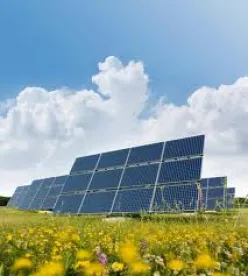In spring of 2017, Suniva Inc. (“Suniva”) and SolarWorld Americas, Inc. (“SolarWorld”) (together, the “Petitioners”), filed Investigation No. TA-201-075 with the International Trade Commission (the “ITC”) under Section 201 of the Trade Act of 1974, Pub. L. 93-618, 88 Stat. 1978, 19 U.S.C. §§ 2101 et seq., which allows the ITC to investigate whether increased imports of a given article are a “substantial cause of serious injury, or the threat thereof, to the domestic industry producing an article like or directly competitive with the imported article[.]” 19 U.S.C. § 2251(a). Upon making a finding of serious injury, the ITC may recommend that the President “take all appropriate and feasible action within his power which the President determines will facilitate efforts by the domestic industry to make a positive adjustment to import competition and provide greater economic and social benefits than costs.” Id. The Petitioners asserted that increased imports of crystalline silicon photovoltaic (“CSPV”) cells and modules seriously injured domestic manufacturers.
On September 22, 2017, the ITC unanimously determined that increased imports of CSPV cells and modules were a substantial cause of serious injury to the domestic industry and, following a remedies hearing on October 3, 2017, the ITC on October 31, 2017 issued its recommendations to President Trump. Although their recommendations varied significantly, in general, the Commissioners advised that the President impose tariff-rate quotas (“TRQ”) on CSPV imports. For example, Chairman Schmidtlein recommended that the President impose on CSPV cell imports an in-quota tariff rate of 10 percent ad valorem and an in-quota volume level of 0.5 gigawatts. For cells that exceed the 0.5 gigawatt volume level, the Chairman suggested a tariff rate of 30 percent ad valorem, and advised that the TRQ be implemented for four years, with the tariff rate being incrementally reduced and in-quota level being incrementally raised during the remedy period. She also recommended that an ad valorem tariff rate of 35 percent (also to be incrementally reduced on an annual basis) be imposed on CSPV modules during the remedy period.
Regardless which remedy the President chooses to impose, the reverberations will be felt throughout the domestic solar industry. In addition, the federal investment tax credit – currently set at 30% - will begin to decrease starting in 2020. The combination of increasing equipment prices and decreasing tax incentives should spur solar developers to consider whether to accelerate project timelines.




 />i
/>i

